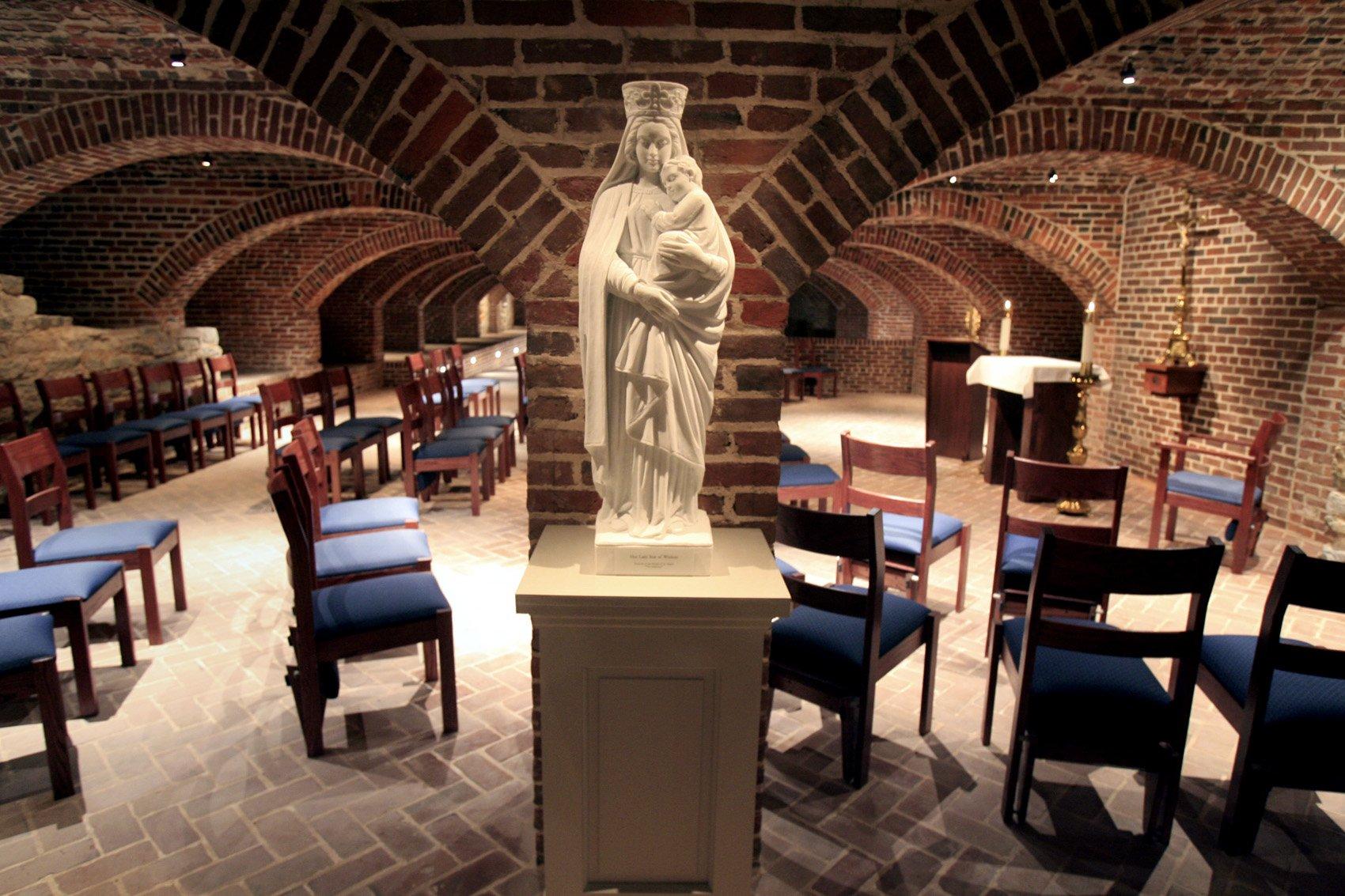I have always loved the portrayal of Wisdom in the Bible, and our youngest daughter is named after her. Sophia in Greek and Sapientia in Latin, she is described with delight and playfulness as God’s helper and co-worker in the actual building of creation, as we saw in the recent First Reading from Proverbs 8 on Trinity Sunday. If you read the book of Proverbs from the beginning, the personification is solid and constant : Wisdom is always “she”. There is no attempt to depersonalise or neutralise her. Many abstract ideas (possibly because of their gender in Latin) are female when personified, the Graces, the Virtues. “Mercy and faithfulness have met; justice and peace have embraced” in Psalm 84/85 always sounds to me like a circle of nymphs in a Roman wall painting, or maybe pre-Raphaelites but more cheerful. There are so few significant positive female figures in the Bible altogether that we have to take them where we find them; most are shadowy and only rarely centre-stage unless actually speaking to Jesus. Male personifications are often less positive (the four horsemen of the Apocalypse, the seven deadly sins, depending on which artist you choose, but of course all the named angels are regarded as male even though they aren’t).
So in Proverbs 8, the personification of Wisdom speaks to explain how she was at God’s side through the whole process of creation, from the very beginning, a female figure at God’s side. Thus for me it grates when she describes herself as “a master craftsman” (Proverbs 8.20), enough to make me check the translation when I got home.
And guess what, it is (I would argue) entirely a mistranslation. I was expecting to find a word like “artifex” in the Vulgate, and then I would argue that you could translate that with a gender-neutral noun (“artist” or “architect”) if you couldn’t think of a female one, but there is simply no noun in the original Latin or Greek versions. I”m not even mentioning the Hebrew text yet, because the early Bible translations (the Vulgate and the Septuagint) were what the early Church used, the Vulgate being the Latin translation of the earlier Greek Septuagint. In Proverbs 8.30, Wisdom says, “I was there with him, cuncta componens”. Cuncta means “everything, the whole, the entirety”, and componens is a word which covers “arranging, composing, constructing, building, ordering, organising”, - in a word, creating, but in a very practical, hands-on way, maybe “making” is a better translation, or even “putting [everything] together”. My problem lies in the language used in the translation used for the readings. As soon as we have “master craftsman”, we have a doubly male mental picture. The Hebrew root of the word in question in the earliest form of the text can be either “one who nurtures or brings up a child” or “one who builds, an architect or artificer”, so what we really need is a word which suggests a nurturing female architect or something similar. What we have instead is a pair of words which remove any hint of the female. The Septuagint (Greek) has Ημην παρ α?τ? ?ρμ?ζουσα, "I was with him arranging things in harmony", which as a church musician I particularly like. And it’s female in Greek, and not gendered in English.
I have a book called Big Mama makes the world by Phyllis Root, illustrated by Helen Oxenbury (Walker Books), which shows creation happening through the actions of a large female figure with a baby (mostly) attached to her hip. Of course there is no reason why God should not be drawn as a female; we are told that he created male and female in his own image. Although Jesus consistently calls God “Father”, there are many references to God’s motherly qualities in the Bible and by the saints, and all our pictures of God are only pictures, after all. In the area of creation, the whole mandala of ideas of gestating, nurturing, growing, producing, bringing into being has beautiful female overtones and connotations, which it is a shame not to take advantage of. The Holy Spirit who dances over the face of the waters in Genesis 1 is a female word in Hebrew, even though Spiritus sanctus is male in Latin. And the language of the Church was Latin, so the Holy Spirit for us has always been seen as male, just like the other two members of the Trinity, though tongues of fire, the sound of a mighty wind and a dove are not especially male in their associations.
I have seen prayers and hymns about the Holy Spirit which simply refer to the third person of the Trinity as “she” throughout, but these make me slightly uncomfortable and I prefer “it”. English does have a neutral pronoun, but we don’t use it very often about beings that we know to have gender. I would happily use “it” of a small baby if I didn’t know its gender, because it doesn’t actually matter much (but some seem to feel that it is offensive, and it matters enough for some parents to have their baby girl’s ears pierced really early on, to avoid confusion). Even some dog-owners will object if you call a dog “it”, though again, I can’t see why it matters. I have read some texts where the author is so concerned not to limit God by pronoun that the word “God” was simply repeated every time, like a label or name; it was slightly odd, but I could see what the author was trying to do.
Because Jesus was incarnate as a man, and because he calls God “Father”, we tend to use “he” for both, but it’s a useful corrective occasionally to try seeing God in a different way. Pronouns are possibly the hardest linguistic element to make more inclusive in English; psalms where “the just man” has been generalised into “one” or “the just” come unstuck on the next line, when they refer to “he” or “his”. But modern linguistic practice is changing here.
The Church is bad at including women; we are still being addressed as “brothers” if not omitted wholly from textual references. I have been rebuked for even asking whether it was all right to add “and sisters”, on the grounds that it’s not important. It is important, if you”re one of the people constantly being written out. One of the strongest messages to emerge from the Synod so far is about the lack of female representation. Unfortunately we do need to keep complaining about this, as the inertia factor pulls very strongly in the opposite direction. The Church has been pretending that women don’t exist for more than two thousand years and grown women still can’t sing God’s praise in many of our cathedrals. Look how long it took to have female orders that were not enclosed, and Mary Ward is still not canonised. I enjoy the psalms which complain about the foolishness and obduracy of “men” (e.g. Psalm 4), but I notice that they tend to get corrected to neutrality more quickly than the lines of praise which leave women out, and many hymns have been bowdlerised similarly, but only in one direction. This process is satirised in Charlotte Perkins Gillman’s Return to Herland, when the heroine innocently asks why her male instructor always says “people” when he is talking about something bad being done, but “men” when the activity is laudable.
I think it is important to keep the references which allow women to feel included because they are few. “He looks on his servant in her lowliness”; that word in my italics is the one gendered word in the whole of the Magnificat, now that we have the neutral “servant” in place of the old “handmaid”. I love the psalm (138/139) where God is described as knitting or weaving, and I am sad that some modern translations replace this image with “cover” or “support”, which is so much less vivid. Another favourite is Psalm 130/131, where God is the mother with a peaceful baby asleep on her lap, an image the Pope makes his own when he falls asleep while he is praying.
To go back to the words to describe Wisdom, where we started, one problem is that so many work words are subtly weakened or denigrated in the female form, if it even exists: poetess, sculptress, actress are all weaker than their male equivalents, so in reaction many women nowadays have reclaimed the male version as common to both. Architect and designer are both gender-neutral in form, but I have a very soft spot for the old word “maker”, and I am pleased to see craftspeople beginning to use it again. So many crafts are practised and kept alive by mainly female practitioners. They tend to be taken less seriously (and less well remunerated) than historically male crafts; compare the general attitudes to knitting and blacksmithing, or weaving and joinery, or needlework and woodcarving. There are far more cooks; but chefs are better paid. I picture Wisdom as an expert maker or crafter, but I want her to stay female even in metaphor. So I would probably compromise on “expertly fitting everything together”, because present participles aren’t gendered in English. The translation does not need to have a female word, it just needs not to be exclusively male.
Nowadays people have been sensitised to pronouns, especially the younger generation, and it is not unusual on-line for them to express a preference as to the pronoun used to refer to them. It is interesting to apply this idea to God. What would his preference be? Surely he would be a “they”: gender-free, plural and relational, the Trinity as a gently-spinning wind turbine.
Kate Keefe composes musical settings for the Mass and writes about the psalms. You can follow her on Facebook, Twitter and LinkedIn.



 Loading ...
Loading ...
What do you think?
You can post as a subscriber user ...
User comments (0)